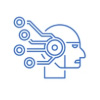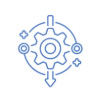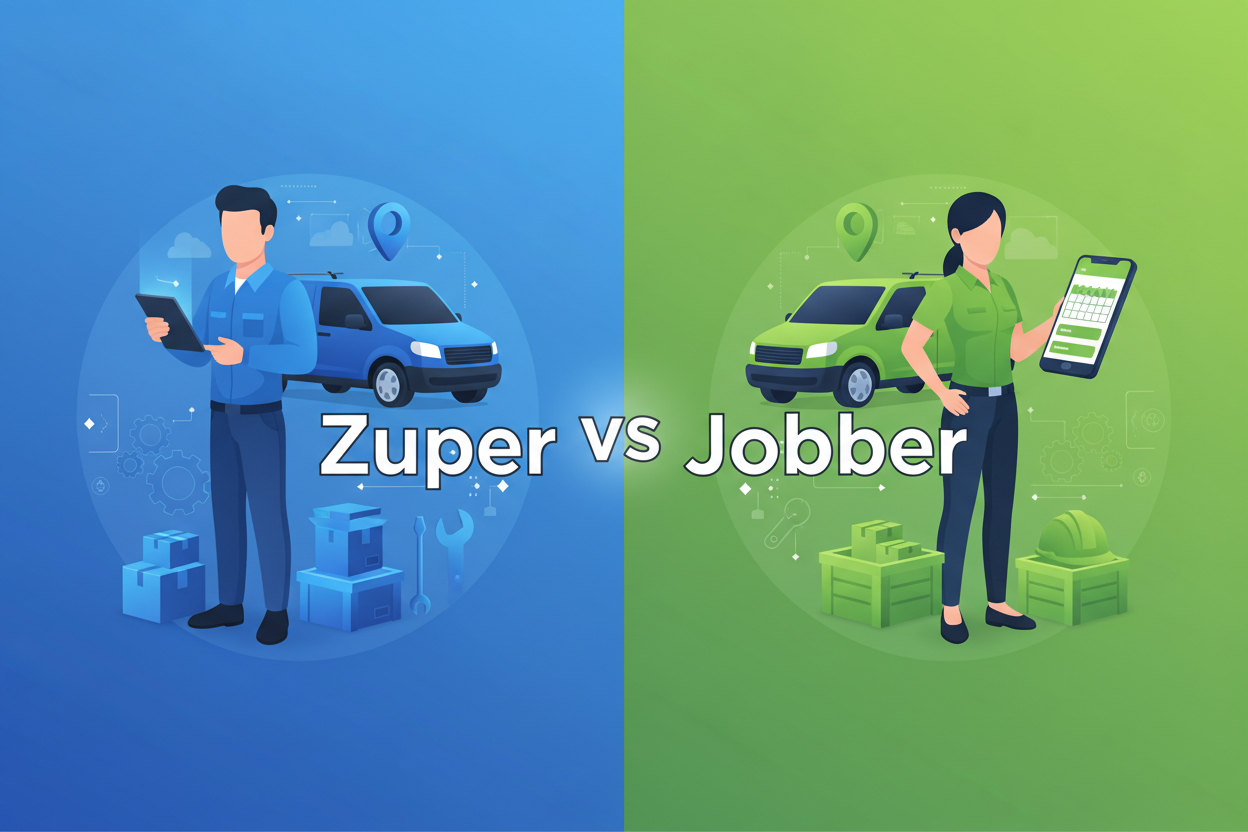Managing complex projects with multiple phases, team members, and moving parts requires more than basic estimating tools. Today’s project-focused service businesses need intelligent software that can handle everything from initial cost calculations to progressive invoicing and milestone tracking.
Whether you’re dealing with labor shortages, cost pressures, or the challenge of coordinating multi-level communications across customers, field teams, and headquarters, the right AI-powered estimating platform can transform how you plan and execute long-term projects.
Our research team conducted an extensive analysis of AI estimating software solutions from January 2024 through August 2025, examining 47 different platforms across the service industry landscape. We evaluated these solutions based on their AI capabilities, industry-specific features, and user adoption rates, ultimately selecting the top 7 platforms that demonstrate superior performance in automated estimation processes. Our analysis focused on the following comparison factors:
- AI Integration & Automation (25%) – Advanced artificial intelligence features for automated estimating, workflow optimization, and predictive analytics.
- Industry Specialization (20%) – Tailored features for roofing, HVAC, plumbing, and electrical contractors.
- Mobile Functionality (18%) – Offline capabilities, intuitive interface, and field team usability.
- Configurability (15%) – No-code configuration options and adaptable workflows.
- Integration Capabilities (12%) – Third-party app connections and ecosystem compatibility.
- Customer Portal Features (10%) – Self-service options and real-time project visibility.
Our team rank-ordered the best AI estimating software using a weighted algorithm and selected the highest-scoring solutions for inclusion in the table below. Following the comparison table, we provide an in-depth analysis of each platform along with summaries of customer feedback.
In the table below, we break down the leading AI estimating software solutions based on their core capabilities and industry focus.
The Best AI Estimating Software of 2025
| Platform | AI Inte-gration & Automation | Industry Specialization | Mobile Functionality | Configura- bility |
Integration Capabilities | Customer Portal Features | Specialty |
| 1.Zuper | Advanced | Multi-Trade Focus | Excellent | High | 60+ Integrations | Comprehensive | Configurable multi-trade operations |
| 2.ServiceTitan | Good | HVAC/Plumbing | Good | Medium | 200+ Integrations | Good | Large contractor management |
| 3.Jobber | Basic | General Service | Excellent | Medium | 40+ Integrations | Basic | Small business simplicity |
| 4.FieldEdge | Good | HVAC/Electrical | Good | Low | 50+ Integrations | Good | Traditional HVAC workflows |
| 5.ServiceMax | Advanced | Enterprise Focus | Good | High | 100+ Integrations | Advanced | Complex asset management |
| 6.Housecall Pro | Basic | Home Services | Excellent | Low | 30+ Integrations | Good | Consumer-facing businesses |
| 7.WorkWave | Good | Multi-Industry | Good | Medium | 75+ Integrations | Good | Routine service calls |
1. Zuper, Best for Intelligent Multi-Trade Automation
Zuper’s approach to AI estimating software centers on creating an adaptable platform that scales with service businesses across multiple trades. The company’s intelligent automation capabilities extend beyond basic estimating to encompass workflow optimization, route optimization, predictive maintenance scheduling, and resource allocation algorithms. Their no-code configuration system allows businesses to modify estimation parameters, approval workflows, and pricing models without requiring technical expertise, positioning them as a solution for companies seeking both sophistication and operational flexibility.
The platform’s mobile application maintains full functionality even in offline environments, addressing a critical pain point for field technicians working in areas with limited connectivity. Zuper’s customer portal provides real-time project visibility with automated SMS and ETA updates, creating transparency that reduces customer service inquiries while improving satisfaction scores. The company’s modular integration approach allows businesses to add or remove functionality based on seasonal demands or market conditions, making it particularly valuable for contractors managing varying workloads across residential, commercial, and industrial projects.
| Summary of Online Reviews |
| Zuper users consistently praise the platform’s “intuitive interface” and “accurate cost predictions.” Teams appreciate how estimates “automatically adjust based on project changes.” They also love the “seamless mobile experience” and find the integration capabilities “game-changing for project visibility.” |
2. ServiceTitan, Best for Large Contractors
ServiceTitan’s Titan Intelligence AI tool is one of the most established platforms in the service industry. The system offers several compelling estimating features, including dynamic pricing recommendations based on market conditions and predictive analytics for demand forecasting. Other AI-powered capabilities include route optimization for technician scheduling, customer lifetime value predictions, and automated follow-up sequences.
ServiceTitan’s estimating accuracy is strong for standard service calls, but has limitations around multi-phase projects. It also has a fixed ecosystem with limited third-party integrations. While it provides a robust mobile app, it does not offer offline capabilities, which could be a problem in remote areas.
| Summary of Online Reviews |
| ServiceTitan customer reviews consistently highlight Titan Intelligence’s “strength in data aggregation and reporting.” Contractors noted that the predictive insights help “identify seasonal trends” they wouldn’t have noticed manually. They reported that workflow automation “requires extensive customization,” which slows down implementation. |
3. Jobber, Best for Small Business Simplicity
Jobber has made notable strides in incorporating AI into its platform, particularly through their QuickBooks integration and automated pricing suggestions. Its AI helps standardize common service estimates using historical data. Its automated estimate creation significantly speeds up workflows, while its seamless integrations with scheduling and invoicing workflows increase efficiency.
Jobber’s AI works well for creating basic estimates, but it only offers basic customization options, which means users might still have to perform some manual work. Its ability to learn from project outcomes is also limited, and it struggles with more complex, multi-phase project estimates. Jobber’s mobile app is easy to use, but it doesn’t offer any offline functionality for field teams.
| Summary of Online Reviews |
| Jobber’s customers say the AI suggestions have “sped up [their] quoting process,” especially for routine maintenance jobs. They report that it’s “helpful for basic estimates,” but that they still need to “manually adjust most complex projects.” They also say the AI features “feel more like smart templates than true intelligence.” |
4. FieldEdge, Best for Traditional HVAC Workflows
FieldEdge has positioned itself as an AI innovator in the field service space, particularly for HVAC contractors. Its platform integrates artificial intelligence primarily through customer service automation and basic predictive analytics. FieldEdge’s recent partnership with Customer Lobby enables automated customer check-ins and service updates. FieldEdge also offers AI predictive maintenance, which analyzes equipment data to forecast service needs. Its algorithm-driven route scheduling helps reduce travel time, and its smart forms feature captures job details with minimal technician input.
While the platform excels at standard service calls, it struggles with complex, multi-phase projects. Its AI capabilities remain primarily focused on template-driven estimates rather than truly intelligent, adaptive project management that modern service businesses require. These limitations mean that teams will still have to perform manual work for many projects.
| Summary of Online Reviews |
| FieldEdge’s customers say its AI “helps with basic scheduling,” but that they still “spend hours manually adjusting estimates when project scope changes.” They also report that the “integration with existing tools works,” but that it “feels limited compared to newer platforms.” |
5. ServiceMax, Best for Complex Asset Management
ServiceMax AI delivers sophisticated predictive capabilities through PTC’s industrial IoT platform. The system excels at analyzing historical service data to forecast parts needs, labor requirements, and project timelines. It has a predictive maintenance integration that factors equipment health into project estimates. Its advanced analytics dashboard has customizable KPIs and reporting. It also has deep ERP integration with SAP, Oracle, and Microsoft systems.
However, ServiceMax AI presents significant implementation challenges, making it suitable for enterprise companies with AI experts on staff. The platform also has a desktop-centric design that limits field team adoption. Its mobile functionality feels like an afterthought, making real-time estimate updates difficult for technicians working on-site.
| Summary of Online Reviews |
| ServiceMax customers consistently mention the “steep learning curve” and “resource-intensive setup process.” They report that the “AI predictions are accurate once configured,” but say that it took significant time to get there and “required consultant support.” |
6. Housecall Pro, Best for Consumer-Facing Businesses
Housecall Pro has made significant investments in AI capabilities, particularly through its AI Team features and CSR AI assistant. Its AI tools focus primarily on customer service automation and basic job scheduling optimization. Its CSR AI handles basic customer inquiries and appointment scheduling with reasonable accuracy. The call summary tool automatically creates job summaries from customer phone calls. It also offers basic route optimization that suggests efficient technician routes based on geographic clustering, as well as automated customer communications and predetermined intervals.
The platform’s AI capabilities remain primarily focused on operational efficiency rather than intelligent estimation. Its estimating features rely heavily on pre-built templates and basic multipliers, which struggle with project variables like site conditions, material availability, or multi-trade coordination. For project-based businesses managing complex, long-term jobs, these limitations become significant constraints.
| Summary of Online Reviews |
| Users appreciate Housecall Pro’s “ease of implementation,” and say the AI scheduling assistant “reduced phone time,” which freed up office staff for more complex tasks. However, they also highlight “limitations in estimate accuracy,” particularly for complex projects requiring multiple phases or specialized materials. |
7. Workwave, Best for Routine Service Calls
WorkWave has established itself as a reliable player in the service management space. Its AI features address basic estimating needs for traditional service businesses. WorkWave’s AI estimating tools excel in straightforward service scenarios. The platform uses historical job data to suggest pricing based on similar past projects, which works well for businesses with predictable, routine service calls. The software’s strength lies in its simplicity—technicians can generate basic estimates without extensive training. For businesses handling standard HVAC maintenance or simple plumbing repairs, WorkWave’s AI provides adequate cost predictions based on labor hours and material requirements.
However, WorkWave’s AI capabilities show limitations when handling complex, multi-phase projects. The system struggles with dynamic pricing scenarios where the project scope frequently changes. Estimates often require significant manual adjustments, particularly for projects spanning multiple weeks or months, jobs requiring specialized equipment or materials, multi-trade coordination scenarios, and custom residential or commercial installations.
| Summary of Online Reviews |
| Customer reviews highlight that WorkWave’s AI “gets them in the ballpark” but say they still “spend considerable time fine-tuning estimates manually.” The platform has many integrations, but their limitations “create data silos,” preventing the AI from accessing comprehensive project information needed for accurate predictions. |
What to Look for in Modern AI Estimating Software
The best AI estimating software will have the following features and characteristics.
 Intelligent Automation Capabilities
Intelligent Automation Capabilities
The most effective AI estimating platforms go beyond simple templates. They analyze historical project data, material costs, labor rates, and market conditions to generate accurate estimates automatically. Look for solutions that:
- Learn from completed project outcomes
- Adjust pricing based on regional cost variations
- Factor in seasonal demand fluctuations
- Integrate real-time material pricing feeds
 Configurable Workflows
Configurable Workflows
Unlike customized solutions that require developer intervention, configurable platforms allow your team to modify processes independently. This flexibility proves crucial when:
- Adapting to new service offerings
- Scaling operations across markets
- Meeting unique customer requirements
- Responding to regulatory changes
 Mobile-First Design
Mobile-First Design
Field teams need access to estimating tools regardless of connectivity. Advanced platforms provide:
- Offline estimate creation and editing
- Photo integration for visual documentation
- GPS-based travel time calculations
- Real-time synchronization when connected



